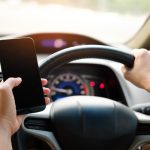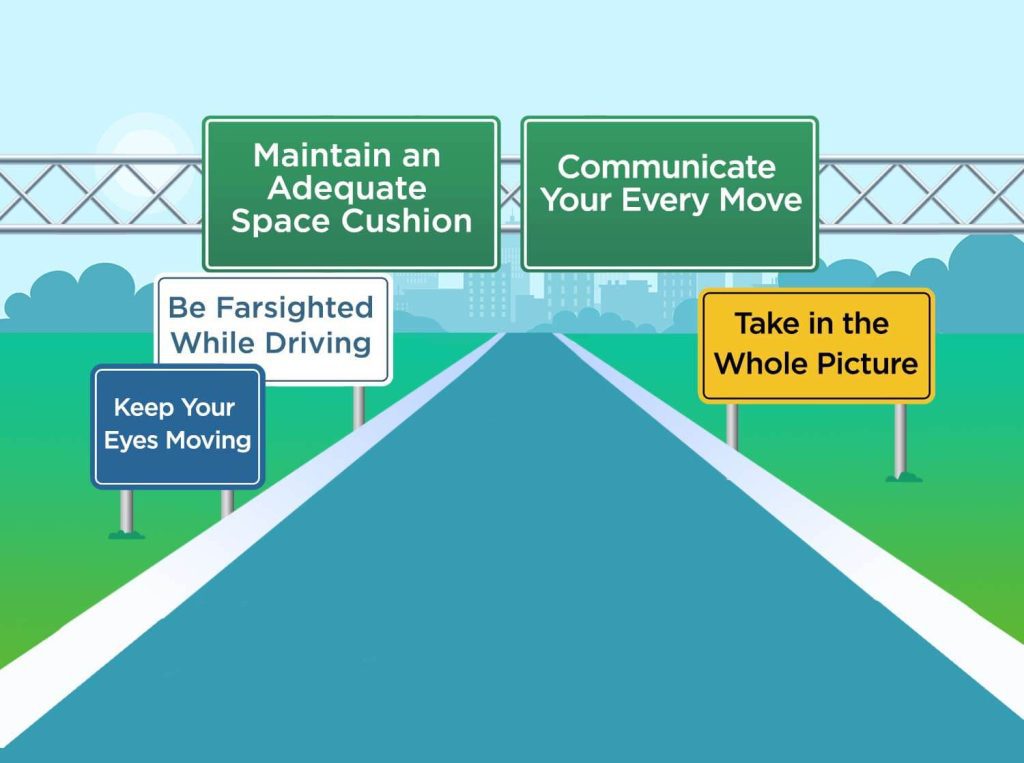
July is peak summer travel season, which typically kicks off July 4th weekend. Turner’s blogs often discuss legal rights, liability exposure, and other important items related to the law. Since one of our specialties is advocating for victims of traffic accidents, we thought it would be useful to highlight 10 tips to help avoid the situation before you need our help.
Remember, we are always available, and we won’t stop until we achieve what you deserve in terms of compensation. Having said that, if we can offer up some ways to avoid traffic accidents, we want to provide that, too. Whether you’re heading out of town or just going for a drive (unlikely, given the cost of gasoline), you’ll need to arrive safely. Use these 10 tips to help you be a safer driver.
No. 1 | Stay Focused Throughout Your Drive
It’s easy to get lost in thought during your commute. It’s important, however, to stay focused on the road and what is happening around you. Distracted driving is one of the leading causes of accidents on the road today.
As you drive, keep the music to a reasonable level and ask passengers to lower the noise level if you notice yourself getting distracted. Be mindful of your lane usage on the road as you drive. For example, if you’re cruising the freeway for several miles, stay out of the left lane except to pass slower-moving vehicles.
No. 2 | Watch the Space Between You and Other Drivers
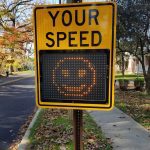 A collision with the vehicle in front of you is common in heavy traffic. Even if you’re paying attention, a driver may suddenly brake for an unknown hazard. If you’re following too closely, you won’t have space to stop.
A collision with the vehicle in front of you is common in heavy traffic. Even if you’re paying attention, a driver may suddenly brake for an unknown hazard. If you’re following too closely, you won’t have space to stop.
Try to follow the 3-second rule when driving. Pick a landmark, such as a specific road sign, and note when the car in front of you passes it. Count out how many seconds it takes you to then pass the same sign. If it’s less than 3, you should slow down to give the other driver more space. Another tip is at least two car lengths between you and the driver in front of you.
No. 3 | Avoid Peak Driving Times
 A lot of accidents happen because of congestion on the roadways. The more cars on the road, the higher the chance two or more of them will collide. Certain times of the day increase the number of cars on the road and make it more dangerous for even the best defensive drivers.
A lot of accidents happen because of congestion on the roadways. The more cars on the road, the higher the chance two or more of them will collide. Certain times of the day increase the number of cars on the road and make it more dangerous for even the best defensive drivers.
If you can’t change your work schedule, try adding an activity at the end of your day to delay your travel to avoid heavy commuting times. Plan to head out a little earlier than usual or leave a little later so you are not rushed.
No. 4| Keep Your Emotions in Check
 Emotional driving can lead to erratic and dangerous driving. Personal emotions from things happening in your life may be hard to avoid. Try to take a few deep breaths before you begin driving and focus on the road to take your mind off of your emotions. If a family dinner involves stressful tensions with a relative, give yourself time to cool off before you decide to head home. Don’t try to talk on the phone to vent to a friend while driving. Finish your call before heading home.
Emotional driving can lead to erratic and dangerous driving. Personal emotions from things happening in your life may be hard to avoid. Try to take a few deep breaths before you begin driving and focus on the road to take your mind off of your emotions. If a family dinner involves stressful tensions with a relative, give yourself time to cool off before you decide to head home. Don’t try to talk on the phone to vent to a friend while driving. Finish your call before heading home.
Other drivers may also cause you to get annoyed, frustrated, or angry. A driver constantly changing their speed in front of you would annoy almost anyone. They may have you wondering if they even have a driver’s license. Take a moment to breathe and consider pulling off somewhere if you find yourself with road rage.
No. 5 | Put Your Cell Phone Away
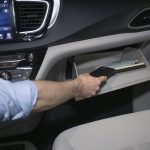 Holding a cell phone and driving is always a bad choice. Plenty of drivers still use them, however. Cell phone use in cars often happens without thought: You get a ping from your phone indicating you have a new message and — without thinking — you grab your phone to read the message … and start responding.
Holding a cell phone and driving is always a bad choice. Plenty of drivers still use them, however. Cell phone use in cars often happens without thought: You get a ping from your phone indicating you have a new message and — without thinking — you grab your phone to read the message … and start responding.
When you’re late to dinner or trying to remember what items you forgot to pack, it’s easy to pick up your phone when driving. Avoid using your phone when you’re behind the wheel by putting it out of sight. Try storing it in a bag in the backseat or putting it in the glove compartment. Turn off the sound or use a “do not disturb” mode when driving.
No. 6 | NEVER Drink and Drive
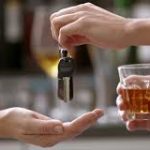 With Independence Day upon us, there is a likelihood you will be out on the town, enjoying a few drinks. Always put a plan in place to get home safely. If you know you’ll be drinking, consider leaving your car at home so there’s no temptation to drive home. Even two drinks can dull your senses, slowing your reaction time. Take public transportation, call a cab, get a ride from a friend — or stay the night — if you’ve had too much to drink.
With Independence Day upon us, there is a likelihood you will be out on the town, enjoying a few drinks. Always put a plan in place to get home safely. If you know you’ll be drinking, consider leaving your car at home so there’s no temptation to drive home. Even two drinks can dull your senses, slowing your reaction time. Take public transportation, call a cab, get a ride from a friend — or stay the night — if you’ve had too much to drink.
The consequences can be expensive and, many times, deadly.
No. 7 | Make Sure Your Car is in Good Shape
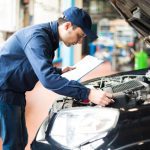 Make sure your car is in good condition before hitting the road. Use a routine maintenance checklist to help you stay up to date on things like oil changes and fluids. Low tire pressure could cause a blowout on the freeway resulting in panic and a loss of control over your car.
Make sure your car is in good condition before hitting the road. Use a routine maintenance checklist to help you stay up to date on things like oil changes and fluids. Low tire pressure could cause a blowout on the freeway resulting in panic and a loss of control over your car.
For longer drives, consider taking your vehicle to a trusted auto repair shop for an inspection. Your mechanic can look over your vehicle and let you know if there’s anything that could cause problems.
No. 8 | Don’t Drive if You’re Tired
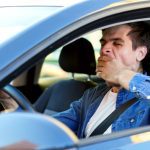 Just like drinking and then driving, fatigue can slow your reaction time when you often need to make quick decisions on the road. It’s easy to get in your car and be lulled to sleep by the monotony of the road after a big dinner (highway hypnosis). Roll the windows down whenever you feel sleepy to help wake you up. The cool, fresh air can help jolt you awake and reenergize you. However, the safest option is to always pull over at a safe spot and take a quick rest before hitting the road again.
Just like drinking and then driving, fatigue can slow your reaction time when you often need to make quick decisions on the road. It’s easy to get in your car and be lulled to sleep by the monotony of the road after a big dinner (highway hypnosis). Roll the windows down whenever you feel sleepy to help wake you up. The cool, fresh air can help jolt you awake and reenergize you. However, the safest option is to always pull over at a safe spot and take a quick rest before hitting the road again.
No. 9 | Take Your Time
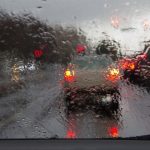 You may be hurrying because you’re late for dinner, but your family would rather you arrive late and safe than not at all. Slowing down just a little can give you the time you need to avoid an accident. Plus, it saves money by reducing gas consumption.
You may be hurrying because you’re late for dinner, but your family would rather you arrive late and safe than not at all. Slowing down just a little can give you the time you need to avoid an accident. Plus, it saves money by reducing gas consumption.
At stoplights, don’t slam the gas pedal down right as the light turns green. Many drivers speed up at yellow lights, causing them to be in an intersection when the light changes. Wait for a second to let any traffic in the intersection settle before you move forward.
No. 10 | Don’t Rely on Other Drivers
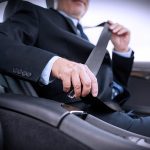
Never assume other motorists are safely driving. Drivers are unpredictable, so you must rely on your judgment to reduce the risk of an accident. The most important aspect of defensive driving is being aware of other drivers and doing your best to avoid them.
Remember, if you are involved in an accident, here are some recent Turner blogs that offer tips and other useful things to remember.
Turner & Turner is here for you and your needs. For more information, call (248) 355-1727.
- 8 Things To Remember Before You Go to the Hospital
- Pro Tip: Documenting an Accident
- How to Read an Accident Report
